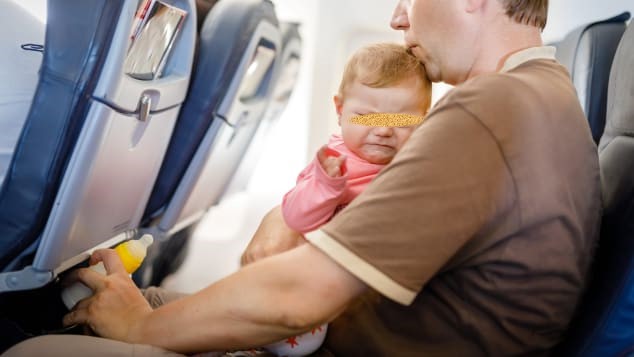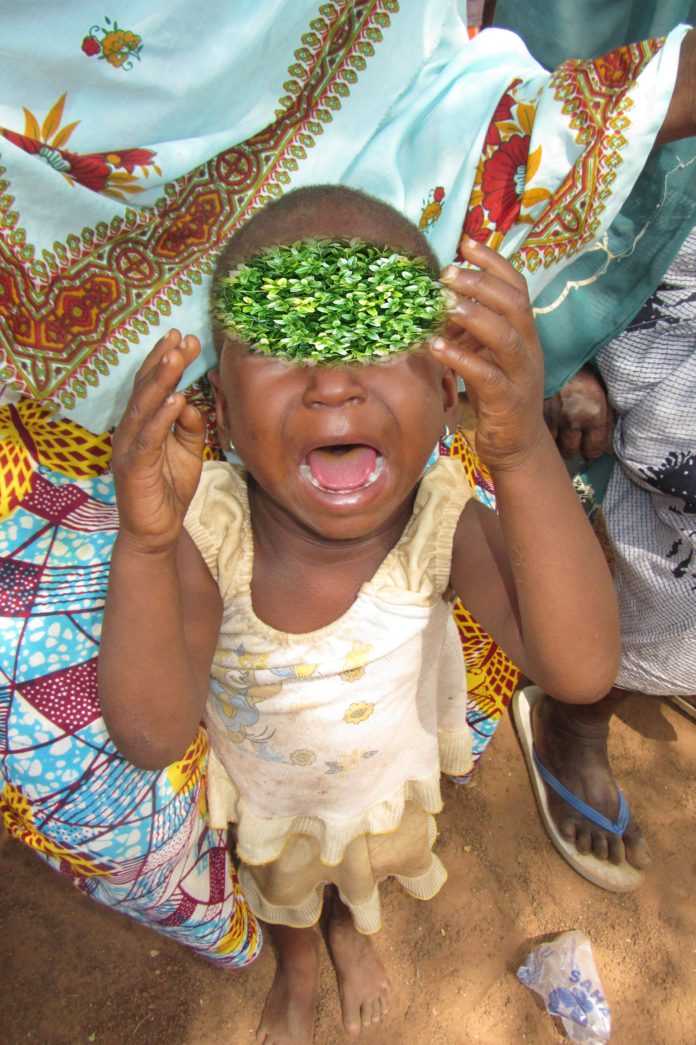When my daughter was about six months old and on one of her first cross-country flights, she began to cry.
She wouldn’t take her pacifier nor a bottle. She wouldn’t respond to being rocked or sang to or read to. She just wailed. And wailed and wailed.
I was upset and wanted to quiet her. I wanted to comfort her, but more than anything, I wanted her to stop because I assumed she was disturbing all the passengers around us.
After a few minutes, the woman sitting in front of us turned around and ordered sternly, “I have five grandchildren. You need to walk that baby. Walk her!” My wife stood up and walked her, up and down the aisle, and after a few minutes, our daughter did calm down and eventually fell asleep in her arms.
Grandma helped us out

Parents really do want to help their children behave in the air.
The one-row-ahead passenger’s command, at the time, felt harsh, but we’ve never forgotten it. We really appreciated the invaluable parenting advice, and the spirit, I believe, that generated it.
That grandma knew that it’s difficult to have a crying baby on a plane, to be the passenger that everyone is judging. Grandma was probably annoyed, but she was constructive about it, and ultimately did us — and everyone around us — a favor.
A lot of travelers could take a lesson from that grandma in empathy and community building.
And so could airlines.
Japan Airlines’ seat selection tool
On September 26, Japan Airlines announced a new booking tool, presumably geared at travelers who want to avoid crying infants on flights.
“Passengers traveling with children between 8 days and 2 years old, who select their seats on the JAL website will have a child icon displayed on their seats on the seat selection screen,” reads the airline’s website.
Many travelers snarkily cheered the announcement, one Twitter user snarling: “Oh why though, I am ALWAYS looking forward to agitated screaming children on Long [sic] flights, the best ones yet can even kick the Back of my Seat while the parents ignore them and my patience We have to give the Japanese some prop.”
Another applauded, “Very useful system! I hate flying with little children onboard, they always cry as loud as they can. I literally [sic] ready to pay more, to fly without any children onboard.”
An airline rule that promotes division
But the policy is problematic for a number of reasons.
We live in a world where those with economic means can segregate themselves from anyone who causes them discomfort.
How about a tool that lets me avoid racists, homophobes, loud talkers, overindulgers on the liquor cart, snorers, those with small bladders or flatulence, people who clip their nails on board? Mansplainers? Manspreaders? What about your garden variety unruly adult passenger?
If I have to sit by you (see categories above), you might have to sit by me. Part of living in a diverse world means that you don’t always get your way — this is a lesson that parents try to teach their children, but a lot of adults could stand a refresher course too.
A policy that allows travelers to avoid sitting near infants pits parents and child-free people against each other, places a wedge between folks who enjoy playing peekaboo with a baby and those who recoil around children.
Yes, crying babies are annoying
I get that crying babies are annoying.
They’re annoying to parents, too, and most parents I know feel embarrassed and contrite when they have a child who is crying or acting up onboard. Most parents I know don’t want to disturb someone’s peace if they can help it and will try anything to make those cries stop.
But sometimes you can’t. And part of living in society with others is accepting things that are annoying. With the world so polarized right now, do we really need airlines encouraging travelers to be more selfish, less community-minded and less empathic toward others?
Parents cannot always control their children’s behavior. Yes, there are parents who are lazy or too permissive. But sometimes children cry, and you can’t always make it stop in an instant. And this isn’t a reason not to travel with children.
Travel is good and healthy for both adults and children. It’s an integral part of making us all better educated citizens of the world. It’s part of how we teach them to be tolerant of people different than themselves, and that customs are different all over the world.
Beyond travel for leisure, sometimes taking an infant on a plane is necessary. Family members get ill and you need to visit them, or someone is graduating and you want to celebrate them. And sometimes children cry for good reason: air pressure changes, turbulence, time-zone adjustments, flight delays and medical conditions, to name a few.
Making parents feel terrible for traveling with children who aren’t always perfectly and quietly behaved is not only ineffective. It’s unkind.
It’s also often sexist. Parent-shaming translates much of the time to mom-shaming. Of course it is fathers’ responsibility to care for their children on flights, and many of them do, but mothers still bear a greater burden of childcare, and that probably extends to time on airplanes.
You don’t have to listen too hard or too long to hear someone judge a mother’s parenting. We work too much outside the home. We don’t work outside the home so we must be lazy. We don’t pay enough attention to our kids. We bulldoze our kids’ lives. And so on.
So when I hear a baby cry on an airplane, I may feel irked, especially if I am tired or stressed, but I try not to be one more person judging the woman who can’t keep her kid quiet in tight quarters. I try to imagine she’s doing the best she can.
I also know her child will likely grow out of it, as my children (now ages 10 and 12) have. It’s a temporary condition. I wish I could say the same for the adults acting out on planes.
Source: cnn.com

